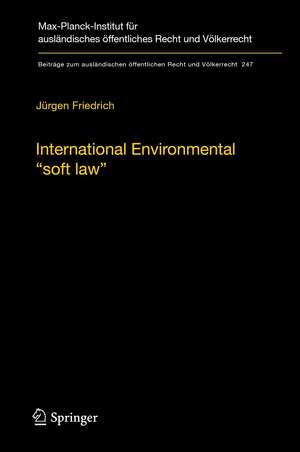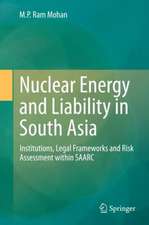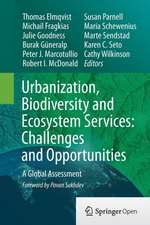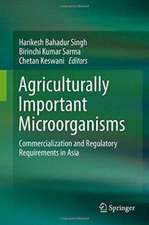International Environmental “soft law”: The Functions and Limits of Nonbinding Instruments in International Environmental Governance and Law: Beiträge zum ausländischen öffentlichen Recht und Völkerrecht, cartea 247
Autor Jürgen Friedrichen Limba Engleză Hardback – 11 dec 2013
| Toate formatele și edițiile | Preț | Express |
|---|---|---|
| Paperback (1) | 708.11 lei 6-8 săpt. | |
| Springer Berlin, Heidelberg – oct 2016 | 708.11 lei 6-8 săpt. | |
| Hardback (1) | 658.05 lei 6-8 săpt. | |
| Springer Berlin, Heidelberg – 11 dec 2013 | 658.05 lei 6-8 săpt. |
Din seria Beiträge zum ausländischen öffentlichen Recht und Völkerrecht
- 15%
 Preț: 655.20 lei
Preț: 655.20 lei - 15%
 Preț: 703.16 lei
Preț: 703.16 lei -
 Preț: 403.15 lei
Preț: 403.15 lei - 23%
 Preț: 843.57 lei
Preț: 843.57 lei - 23%
 Preț: 849.36 lei
Preț: 849.36 lei -
 Preț: 504.24 lei
Preț: 504.24 lei -
 Preț: 479.03 lei
Preț: 479.03 lei -
 Preț: 383.71 lei
Preț: 383.71 lei - 15%
 Preț: 443.64 lei
Preț: 443.64 lei -
 Preț: 502.11 lei
Preț: 502.11 lei - 15%
 Preț: 443.96 lei
Preț: 443.96 lei -
 Preț: 492.96 lei
Preț: 492.96 lei -
 Preț: 488.45 lei
Preț: 488.45 lei -
 Preț: 502.49 lei
Preț: 502.49 lei - 23%
 Preț: 848.02 lei
Preț: 848.02 lei - 15%
 Preț: 453.30 lei
Preț: 453.30 lei -
 Preț: 493.47 lei
Preț: 493.47 lei - 15%
 Preț: 448.85 lei
Preț: 448.85 lei - 15%
 Preț: 452.29 lei
Preț: 452.29 lei -
 Preț: 490.18 lei
Preț: 490.18 lei - 15%
 Preț: 451.32 lei
Preț: 451.32 lei -
 Preț: 494.98 lei
Preț: 494.98 lei - 15%
 Preț: 499.86 lei
Preț: 499.86 lei - 15%
 Preț: 447.71 lei
Preț: 447.71 lei - 15%
 Preț: 469.31 lei
Preț: 469.31 lei - 23%
 Preț: 849.81 lei
Preț: 849.81 lei - 13%
 Preț: 636.05 lei
Preț: 636.05 lei - 15%
 Preț: 473.34 lei
Preț: 473.34 lei - 18%
 Preț: 858.76 lei
Preț: 858.76 lei -
 Preț: 495.58 lei
Preț: 495.58 lei -
 Preț: 408.74 lei
Preț: 408.74 lei - 15%
 Preț: 475.28 lei
Preț: 475.28 lei - 15%
 Preț: 473.99 lei
Preț: 473.99 lei -
 Preț: 512.73 lei
Preț: 512.73 lei - 15%
 Preț: 602.71 lei
Preț: 602.71 lei - 23%
 Preț: 852.03 lei
Preț: 852.03 lei - 15%
 Preț: 678.83 lei
Preț: 678.83 lei -
 Preț: 356.66 lei
Preț: 356.66 lei - 18%
 Preț: 756.82 lei
Preț: 756.82 lei - 15%
 Preț: 640.70 lei
Preț: 640.70 lei - 15%
 Preț: 588.24 lei
Preț: 588.24 lei - 18%
 Preț: 1167.51 lei
Preț: 1167.51 lei - 18%
 Preț: 830.46 lei
Preț: 830.46 lei - 15%
 Preț: 704.32 lei
Preț: 704.32 lei
Preț: 658.05 lei
Preț vechi: 774.18 lei
-15% Nou
Puncte Express: 987
Preț estimativ în valută:
125.91€ • 131.47$ • 104.21£
125.91€ • 131.47$ • 104.21£
Carte tipărită la comandă
Livrare economică 05-19 aprilie
Preluare comenzi: 021 569.72.76
Specificații
ISBN-13: 9783642449451
ISBN-10: 364244945X
Pagini: 550
Ilustrații: XXI, 503 p.
Dimensiuni: 155 x 235 x 35 mm
Greutate: 0.91 kg
Ediția:2013
Editura: Springer Berlin, Heidelberg
Colecția Springer
Seria Beiträge zum ausländischen öffentlichen Recht und Völkerrecht
Locul publicării:Berlin, Heidelberg, Germany
ISBN-10: 364244945X
Pagini: 550
Ilustrații: XXI, 503 p.
Dimensiuni: 155 x 235 x 35 mm
Greutate: 0.91 kg
Ediția:2013
Editura: Springer Berlin, Heidelberg
Colecția Springer
Seria Beiträge zum ausländischen öffentlichen Recht und Völkerrecht
Locul publicării:Berlin, Heidelberg, Germany
Public țintă
ResearchCuprins
Part I: Nonbinding instruments in international practice.- Part II: The role and limits of nonbinding instruments.- Part III: The legitimacy of nonbinding instruments.- Part IV: Concluding summary.
Textul de pe ultima copertă
In international negotiations, the question of the design and the legal form of the negotiated instrument is as complex as it is often controversial. Intended as a read for both practitioners and academics, this book provides a comprehensive treatise of the characteristics, the potential and the limits of nonbinding instruments in international environmental law and governance. An extensive overview and typology of nonbinding instruments as well as several case studies from the areas of fisheries (FAO), hazardous substances (UNEP/FAO) and corporate social responsibility (OECD) provide the material for an in-depth analysis of the role of nonbinding instruments on all levels of governance. The book demonstrates the potential but also highlights the limits of nonbinding instruments in the interplay with customary and treaty law (e.g. UNCLOS, WTO) as bases for interinstitutional linkages and as tools to shape the behaviour of states and private actors. Legitimacy challenges arising from this form of exercise of authority are then discussed in the final chapter, alongside with remedies to address possible concerns.
Caracteristici
Comprehensive overview, many examples and in-depth case studies provide rich reference material for both practice and research Analysis of functions and limits will enable decision-makers to take more informed decisions on legal form Legitimacy analysis with its specific focus on nonbinding norms provides a new perspective for researchers and gives suggestions for practitioners working in national government, NGOs and international institutions



















